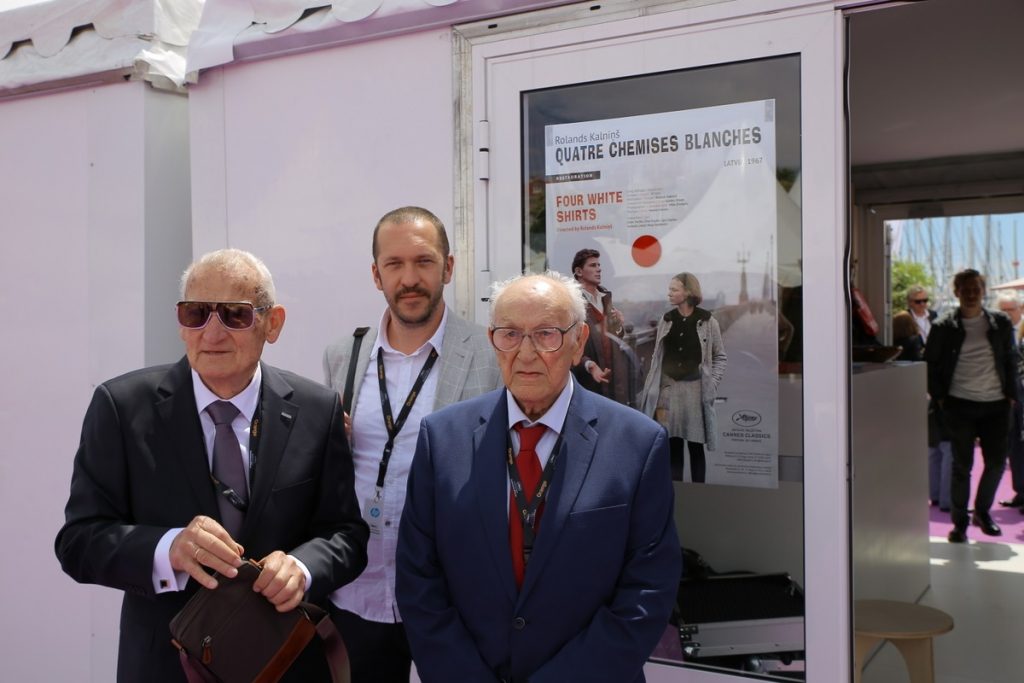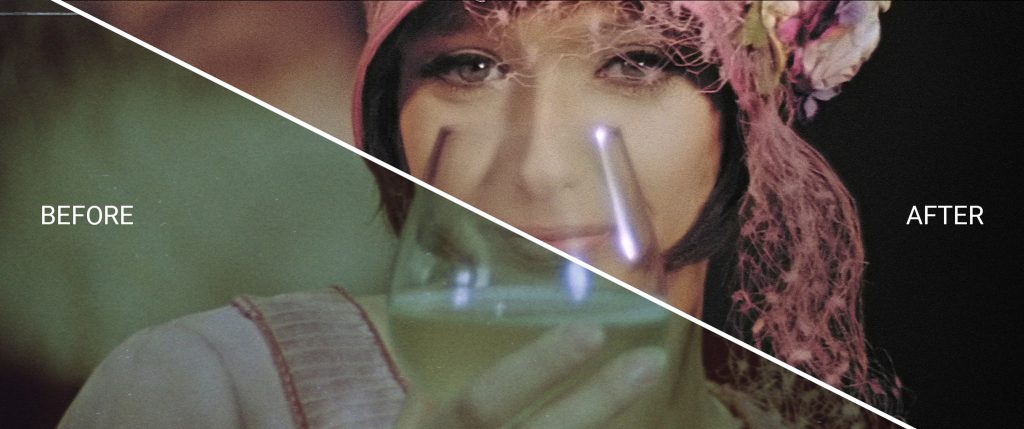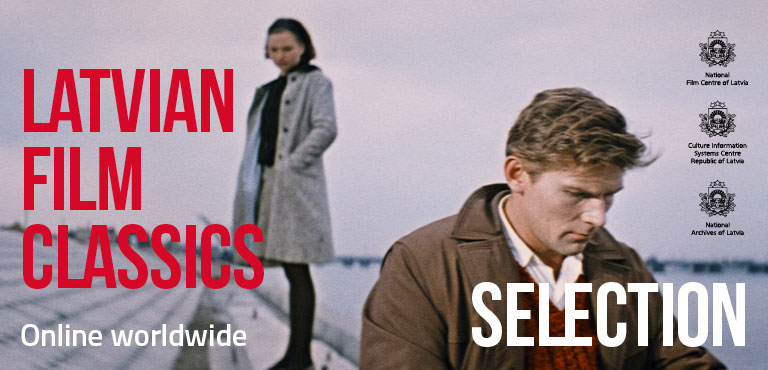From the past to the future: 15 years of film restoration in Latvia
Dita Rietuma, director of the National Film Centre of Latvia
The development of digital technologies has contributed to the revival and popularity of classic films worldwide. Major European film festivals are organising programmes for restored and classic films, and events and festivals showcasing classic films that have experienced a rebirth – that is, high-quality restoration – are becoming more and more popular. From the point of view of a professional and film historian interested in cultural and historical processes, we live in a wonderful time, when rare archival treasures – films that just a couple of decades ago could only be found in hard-to-access collections in a few archives around the world – are becoming easily available.
In the 21st century, classic films have become important cultural material that can be reintegrated and reincorporated into contemporary cultural life.
The triumph of technology and the development of internet platforms, which have facilitated both the restoration and digitisation of films and their accessibility, have undoubtedly served as a prerequisite for this process.
In our case, the restoration of classic films is also a prerequisite for bringing Latvia’s
heritage of films to the fore internationally and marking the place of Latvian film culture in European history. For Latvian audiences, the films made at the Riga Film Studio during the Soviet occupation have acquired the significance and weight of the “golden age of Latvian cinema”, but unfortunately, these films are little known or even unknown outside Latvia. (This is mainly true of feature films made in Latvia in the second half of the 20th century, although classics of Latvian documentary cinema may be in a slightly better situation, especially certain works by Latvian filmmakers of the 1960s and 70s who were associated with the era of the so-called Riga Poetic Style.)
I will always remember the astonishment and surprise of the French film professionals, the organisers of the Cannes Film Festival, when they saw the film Four White Shirts (1967) by the Latvian director Rolands Kalniņš (1922–2022). It is a work that clearly resonated with the New Wave and modernist trends in Europe in the 1960s. This was the main reason why Kalniņš’ film, which had been censored and excluded for many years from Latvian cultural processes, had its international premiere in the Cannes Classics programme in 2018. The event was not only emotionally moving for the film’s makers, Kalniņš and cinematographer Miks Zvirbulis; it was also significant for Latvian film culture as a whole. In fact, the premiere of Four White Shirts at Cannes marked the ability of Latvian cinema to exist outside the frame of “Soviet cinema” – that virtually anonymous melting pot into which Latvian cinema was thrown many years ago.

The international revival of Four White Shirts was also possible thanks to the high-quality restoration of the film, which involved several Latvian cultural institutions and Studio Locomotive, which in recent years has been purposefully developing precisely this area of its activity, namely, film restoration. Another international presentation of a restored classic Latvian film took place in autumn 2023 in Lyon, France, at the Lumière Film Festival (which focuses on classic and restored films), where professionals were introduced to the restored version of director Juris Podnieks’ famous documentary Is It Easy to Be Young? (1986). This event was likewise the result of a collaboration between several institutions – the State Archives of Latvia, the National Film Centre of Latvia and the State Culture Capital Foundation – and the professional work of Studio Locomotive.
The history of the restoration of Latvian cinema began fifteen years ago.
The first film to be restored (in 2008, with funding from the state and screened with special publicity by the National Film Centre of Latvia) was Jānis Streičs’ legendary comedy A Limousine the Colour of Midsummer’s Eve (1981), which in Latvia has achieved the status of a cult film.
Further restorations were made possible by funding from the European Regional Development Fund (ERDF), which was put to use in the collaboration between the National Film Centre and the Culture Information Systems Centre (CISC), as a result of which eleven feature films and nine animated films from the golden age of Latvian cinema were restored in the period up until 2011. Highlights of Latvian cinema from 1930 and 1955, as well as classic films from the 1960s and 70s, including a selection of films from 1966 to 1978 by the master of puppet animation Arnolds Burovs, were made available in a new level of technical quality. At the time, the restoration work was carried out by the Danish company Nordisk Film.
After the ERDF project, there was a five-year hiatus until 2016, which happened to be the year Latvia celebrated the 80th birthday of film director Jānis Streičs. That year, the National Film Centre in cooperation with the State Archives organised the restoration of two works by Streičs: My Frivolous Friend (1975) and Strange Passions (1983). The films were restored by Studio Locomotive, and a year later, in cooperation with the State Archives and with financial support from the Culture Capital Foundation, the studio also restored Streičs’ film The Child of Man (1991). It should be noted that Studio Locomotive has restored all of the subsequently mentioned Latvian films. Over the years, the studio’s professionals have honed and refined their skills, which are now in demand internationally and known under the Locomotive Classics brand.
In 2017, with support from the National Film Centre of Latvia, Rolands Kalniņš’ outstanding film Ceplis (1972) was restored, thus marking the director’s 95th birthday. In 2018, the historic screening of Four White Shirts at the Cannes Film Festival took place, which has been the most significant international success of a restored classic Latvian film to date. The following year, 2019, saw the restoration of the artistically and thematically significant film Stone and Rubber (1966) by Rolands Kalniņš, which had been banned by Soviet censors.

The second major, intensive period of film restoration began in 2018, thanks again to ERDF funding. As part of the first phase of the ERDF project “Digitisation of Cultural Heritage”, the State Archives of Latvia restored fifteen films (nine feature films and six documentaries) that had been selected together with experts from the National Film Centre of Latvia. In 2021–22, as part of the second phase of the ERDF project “Digitisation of Cultural Heritage Content”, the State Archives restored nineteen films (six feature films, seven documentaries and six drawn animation films), also selected together with experts from the National Film Centre.
In the fifteen years of Latvian film restoration, there have also been special initiatives. For example, in 2020–21, four feature films aimed at children’s audiences were restored with financial support from the State Culture Capital Foundation of Latvia. In 2020, the Ministry of Culture of Latvia supported the restoration of several films by documentary filmmakers Ansis Epners, Laima Žurgina and Herz Frank. In 2019, the State Archives of Latvia in cooperation with the Baltic Pearl Festival and the Culture Capital Foundation restored the film The Times of the Surveyors. And so on.
A total of forty feature films, twenty-five documentaries and fifteen animated films have been restored between 2008 and 2022.
The greatest financial support in this process has come from several ERDF projects, which have provided funds for the largest number of restored films. But even during the “moneyless” period, the National Film Centre as well as the State Archives of Latvia sought opportunities to ensure the continuity of film restoration and ensure the promotion of classic Latvian films both locally and internationally. It is significant that the restored classic films are generously available on the filmas.lv portal, and the operation of this website is also made possible thanks to the collaboration between these same Latvian cultural institutions, the National Film Centre and the State Archives. Since 2020, a selection of restored classic films with English subtitles has also been available online worldwide, and in 2022 this selection was expanded to thirty films: eighteen feature films, six documentaries and six animated films.

The film restoration process must definitely continue. Although many of the most popular films in Latvian cinema history have already been technologically restored, this is still only a small fraction of the films once made at the Riga Film Studio. And many of those films are worth rediscovering.